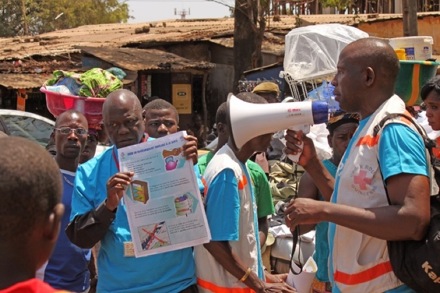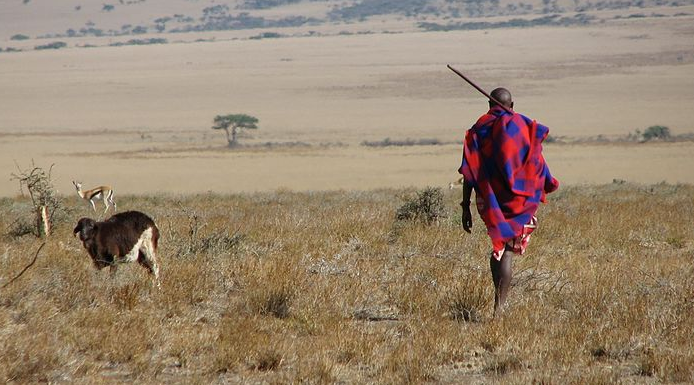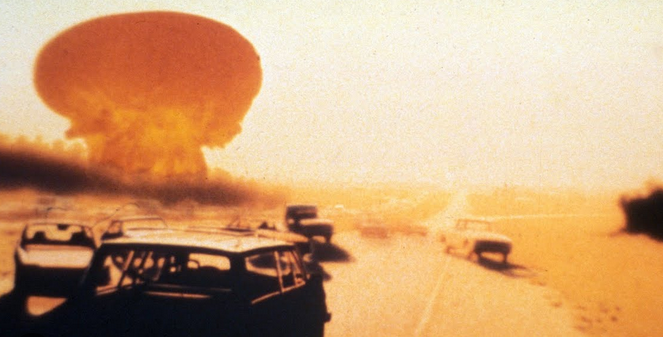Healthcare workers in West Africa are challenged
As of this writing, the death toll from the worst Ebola outbreak in Africa stands at over 2,000 with Liberia the hardest hit. Liberia’s death tool is at 1,224 people and continues to climb.
According to the latest figures released by the World Health Organization (WHO), the virus is more widespread in Liberia with confirmed cases in 14 of the 15 counties. In Guinea, it’s still mostly confined to the forest region which is far away from Conakry, the capital. In Sierra Leone, it’s “geographically limited” as well.
The Ebola outbreak started in March 2014. That was in Guinea and from there it spread to Liberia and Sierra Leone.
Three months later I was in Liberia with a documentary project on ethnic and cultural diversity. To be precise, I arrived in Liberia on June 27, 2014. Though Ebola was reported in the country, it wasn’t by then considered a national emergency as it is today.
At the time the fight against the deadly disease was not of high level intensity as it is now because it was not an issue that was causing any alarm among the population. While the Ministry of Health might have been fighting the war against Ebola the best it could, there was serious denial among the population.
The Ministry and the entire government were been accused of using Ebola as a scam to receive donation of millions of dollars from the international community that would vanish in thin air. That’s why everyone was going about their normal business as if to say nothing threatening was in the country.
The one week I spent in Monrovia before heading to Nimba County, I was meeting and greeting people with no cause to worry about Ebola. All along it was the normal handshake and the moment you talked about Ebola it was dismissed as another government scam to fool the international donors.
A headline in Frontpage Africa, a leading newspaper in the country was titled, “Liberia: Ebola Extortion? Senator Says Authorities Inflated Outbreak.” In the article, Grand Kru County Senior Senator, Cletus Wotorson, was quoted to have have said: “What kind of Ebola? That thing you did to get donor funding your say EBOLA in Liberia?”
It is said that the senior senator made this remark when another senator was speaking on the senate floor addressing the the Ebola crisis. The newspaper further reported, “In the wake of fresh cases resulting in five deaths reported in next-door Sierra Leone this week, a senior senator in Liberia’s national legislature, Cletus Wotorson (UP, Grand Kru) believes that the noise made by health authorities was much ado about [nothing] and intended to extort money from donors.
Senator Wotorson during a regular senate session alleged that the pronouncement concerning Ebola outbreak in Liberia was a ploy to attract donor funding.” If a senator can argue that there is no Ebola in the country and that the government is just lying to get money from international donors, then it should be no surprise why ordinary people on the streets will deny the existence of the deadly disease in Liberia.
Going Outside of Monrovia
This was the prevailing national state of mind, concerning Ebola in Liberia, when I left from Monrovia on July 8, 2014 to my home county of Nimba. Though the subject of my documentary project is “Ethnic and Cultural Diversity,” it has special emphases on Nimba County for two important reasons: that’s where I was born and it’s discussed at length in my book, “The Land of My Father’s Birth; and, since the end of the war more than 10 years ago, there has been constant land dispute between the three main ethnic groups, Manos and Gios on one side and the Mandingoes on the other side.
Though the president had intervened by setting up a presidential committee to resolve the land dispute and committee completed its jobs and submitted its founding to the president, the fight over land is not yet completely resolved. So as part of my documentary project, I wanted to explore the effect the years of peace-making has had on the relation between the three ethnic groups that have been involved in this land dispute.
So when I visited Saclepea, my home town, Kpaytuo, and Tengbein, Ebola was not on my mind. It was not part of the discussion during the two days I was in the county.
When I met Ayouba Sanoe who spent his refugee days in Sierra Leone and Guinea and is now firmly back in his home town of Saclepea, we didn’t talk about Ebola. Long before the war, Ayouba Sanoe was a motorbike mechanic in Saclepea. When he fled from his home because of the war, he became a wanderer in the sub-region. He went to Sierra Leone, and Guinea and then back to Monrovia. Well, life for him in Monrovia wasn’t that bad but he always felt like going back home to Saclepea to re-establish himself.
Today, Ayouba Sanoe is back and fully grounded in his at home in Saclepea. Though still looking young, he’s one of the elders of the town. The fact that Ayouba Sanoe is considered an elder is an indication that many of the people belonging to an age that is considered elders in our villages and towns are either in their graves or are too feeble to play any active role in the affairs of their communities.
It is now common to see young people as town chiefs or elders. According to Ayouba Sanoe, having traveled to many places, “nowhere feels like home, that’s why I came back and I am thankful that I am alive and well.” According to him, “this is where I was born and raised and being back here feels great.” Ayouba urged me to take the message to the Saclepea Mandingoes in Monrovia to “come home and rebuild.”
He said it will be a good idea to see all the Mandingoes return and rebuild their homes. Touching on the relationship between the Manos and Gios in town, and ethnic reconciliation, he said, “here we live side by side in peace and harmony trying to hold on to the legacy of our forefathers who built this town together.”
From the other people I met and talked to such as Sekou Fofana, Chris Zogbay, and the city mayor of Saclepea, Marie Yileyon, the message was the same. Sekou Fofana who is a businessman is operating an auto parts shop. He’s eager to encourage anyone to to return home. Visit the city mayor in her office; she’s eager to tell you how she has been encouraging everyone to come together as one people to develop their town.
So when I left Saclepea on July 10 to head back to Monrovia, I intended to write an article with the headline, “Mandingoes in Saclepea Call on their Kinsmen to Return Home.”
Deeply Held Cultural and Religious Beliefs
A few days after I returned to Monrovia from the interior, the government stepped up its sensitivity campaign of “no handshakes” and encouraging regular hand washing with water mixed with chlorine to halt the spread of Ebola.
Whether visiting private homes, government offices, or business centers, hand washing has become a strong regiment in the government’s anti-Ebola sensitization crusade. Even with this stepped up sensitivity campaign, there were still widespread denial among the population about Ebola.
This is due to long held religious and cultural believes. In Buchanan, I argued with some friends who were arguing that Ebola is not true. They presented all kinds of conspiracy theories about how the “White people are experimenting new medication for population control in Africa.”
I spoke with Dr. Solomani Konneh who works at the government hospital JFK and also operates his own clinic on Jamaica Road. He said during the early stage of the outbreak, he went around various mosques to sensitize the Muslim community. He told me his attempts were not welcomed by the imams who were dismissive, arguing that “only God can take lives.”
Not only were the Muslim clerics dismissive of the disease, it was hard to convince them of what to do when relatives and friends were diagnosed with the disease and when they died as a result of it.
The best time to show affection and care to loved ones is when they are ailing, or when they die. This is a common practice everywhere.
Unfortunately, traditional ways of expressing affection are anathema when it comes to controlling Ebola’s spread.
People were told to abandon their mothers, fathers, sons and daughters when the afflicted needed them the most. People who found it very difficult to accept this and had direct contact with the sick or dead persons also became infected.
Many people said they could not abandon their loved ones in sickness and in death; this contributed tremendously to the increased death rate among the population. There have been endless announcements in the Diaspora Liberian community of relatives and friends that have died. In some cases families have lost as many as five or 10 siblings.
There is also widespread belief among some Christians that Ebola is a curse from God. A very good Christian friend of mine argued that “because we have sinned so much, God sent Ebola as a punishment for our wicked ways.” So because of this belief churches are now full of people who don’t normally go to church.
If you believe that it’s a curse and only God can take Ebola away, you may not care that much about the scientific measures that are required to prevent contracting the disease. This has also been a contributing factor to the escalating death toll in Liberia.
My Last Days in Monrovia
One morning while driving, I saw a crowd on Somalia Drive looking at a dead body. Three days later the body was still there. It took citizens’ action, calling on the authorities to remove the body.
On another occasion residents of Jacob’s Town mounted a road block, stopping all cars from going in either direction. They wanted to protest the government’s failure to remove the body of another dead victim.
I heard news of two bodies at the mosque in Black Jinah and that the imam and everyone were afraid to bury them. People were dialing in radio talk shows to alert the government of dead bodies around the city.
I had already confirmed my departure from Monrovia for August 8. Then news broke that prominent consultant Patrick Sawyer had died and the Arick Air suspended flights to Liberia. Passengers were advised to buy one way plane tickets, out of their own pockets, to Ghana.
I did begin to think of my own mortality and about the care of my family in the U.S.; my children are ages 12, five and two. I finally left on Kenya Airway’s last flight out of Monrovia.
Since my return to the United States many people have told me they were worried about me traveling to all these places and meeting all these people in Liberia.
I had posted pictures of my encounters with people in Nimba, Gbapolu and elsewhere in Liberia, on social media. While there I did apply preventive measures such as no-hand-shakes and washed my hands regularly.
I observed the human toll as well as the impact on social services first hand.
While I felt a huge sense of relief that I’ve managed to join my family in the U.S., my biggest worry is now about my extended family members in Liberia.
I am fully committed and dedicated to spreading the message of awareness and to involvement in fund raising activities on social media to help victims and to control the spread of Ebola.
I urge all people of conscience around the world to join this campaign to fight this Ebola outbreak in a number of African countries.
Nvasekie N. Konneh is a Liberian poet and writer and veteran of the US Navy. He’s the author of “Going to War for America” and “The Land off My Father’s Birth,” a memoir of the Liberian civil war. He recently returned from Liberia where he was shooting a documentary on ethnic and cultural diversity. He can be reached at [email protected] or (267) 206-8909.












